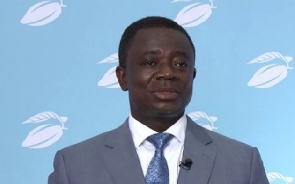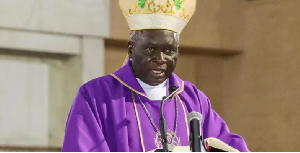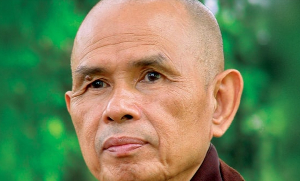Defense lawyers in the case of the Republic verses Stephen Opuni, Seidu Agongo and Agricult Ghana limited, have clashed with the Judge presiding over the case over the pace of the trial.
In a heated exchange between lawyer for the first accused person [Stephen Opuni], Samuel Cudjoe, and the presiding Judge, over what the defence team says is an attempt by the judge to speed up proceedings, the defence team sort to challenge the judge over his ruling ordering lawyer for the second and third accused persons [ Seidu Agongo and Agricult Ghana Limited], Benson Nutsukpui to continue with his cross examination of the second prosecution witness. The heated exchanges resulted in the presiding Judge telling lawyer Samuel Cudjoe not to “provoke him”, “not to put words in his mouths” and to stop “showing off in his Court”.
It will be recalled that at the last Court sitting on the 6th of February 2019, Defence Lawyers earned an adjournment, in order to read a report by the Cocoa Research Institute of Ghana (CRIG). The CRIG report was not prepared as a result of the order of the court. The report came about after the first Prosecution Witness in the case, the Executive Director of Cocoa Research Institute of Ghana (CRIG), established a committee to look into circumstances which led to the disappearance of a document which was requested for by the defence team during his cross examination as a witness in the ongoing trial, but could not be traced.
Defence Lawyers were expected to continue with their cross examination of the second Prosecution Witness who has already been led by State Prosecutors to give his evidence. However, at the commencement of sitting, Lawyer for the second and third Accused Persons [ Seidu Agongo and Agricult Ghana Limited], Benson Nutsukpui, indicated to the court that having been served with the said report that morning, they would pray the court for an adjournment to allow them to study the report and to ascertain if they would require the first Prosecution Witness to be recalled with the leave of the court for further cross examination. This position of the lawyers for the second and third accused persons received the backing of lawyer for the first accused person [Stephen Opuni], Samuel Cudjoe.
The Director of Public Prosecution (DPP), Yvonne Atakora Buabisa, on behalf of the State argued that the contention over whether or not the fertilizer samples which were presented to CRIG for testing by the second Accused Person and his company, Agricult Ghana Limited, was in liquid form or powder, had been dealt with during the testimony of the first Prosecution Witness, the Executive Director of CRIG, Dr. Franklin Amoah. The CRIG report, she said, only confirmed the position of the CRIG boss as well as reaffirmed the fact that the said document is indeed missing. She added that the powder sample of the fertilizer which was submitted to CRIG for testing has also been admitted as an exhibit in the trial and that the demand by the defence team for an adjournment to read the report before they proceed with the cross examination of the second Prosecution Witness is a grand scheme to delay the trial.
Justice Clemence Huyenuga’s court however ruled that even though the said report was not put together at the instance of the court, in the interest of justice, it would only be right in the wisdom of the court to grant a very short adjournment to enable the Defence team to read the report before the case continued. He therefore adjourned sitting to tiday, the 18th of February, 2019, for hearing to resume.
b/>Background
Seidu Agongo, acting on behalf of Agricult, submitted to the Cocoa Research Institute of Ghana(CRIG), fertilizer for testing. The testing was supposed to be applied in two phases; applied to seedlings and applied to matured plants for at least two planting seasons.
The AG says testing was carried out for only the first phase after which report recommending use was given without the second phase testing. She proceeded that investigations revealed that former COCOBOD CEO, Dr. Stephen Kwabena Opuni, wrote to CRIG asking that they shorten the testing period. Dr. Opuni subsequently wrote to Seidu Agongo that his fertilizer had been certified for use on cocoa after which a certificate was issued by CRIG.
Agricult, despite not applying for renewal of the certificate for 2015 and 2016 as required, allegedly, upon the instance of Dr. Stephen Opuni, had its license renewed and went ahead to further supply the fertilizer without any testing.
Dr. Opuni then applied to the Public Procurement Authority for approval for Agricult Ghana Limited to be single sourced to procure 700,000 litres of the fertilizer although conditions for single sourcing had not been satisfied. In that letter, Dr. Opuni stated the price as $19,250,000. The nature of the product was captured as liquid despite it being powdery form. The AG further told the court as at the time of writing to PPA, Agricult had not written to COCOBOD stating a price as is required by law.
The Public Procurement Authority then wrote to the COCOBOD boss requesting for value for money analysis. According to Ms Akuffo, the first accused did not provide this but rather misrepresented to PPA that in compliance with advice from PPA Board in 2008, Agricult Ghana Limited had been pre-qualified for the supply of the fertilizer although Dr. Opuni knew this was not true.
On that basis, the PPA board approved COCOBOD’s request for single sourcing of 700,000 litres of the fertilizer.
In 2014, Dr Opuni once again wrote to PPA requesting approval to hand Agricult contract to supply a liquid form of fertilizer through sole sourcing even though conditions had not been met, the Attorney General said. The AG said the PPA approved this request. Dr. Opuni then put in another request which was also approved.
In November 2015, the PPA approved the application for single source procurement. Three separate agreements were signed and executed by Seidu Agongo’s Agricult Ghana Limited. Investigations she said, had revealed that the contracts were executed when the company did not have a valid certificate to supply the fertilizer.
Whereas the material safety data sheet accompanying the fertilizer that was originally submitted to CRIG for testing described the substance as powdery, Dr. Opuni in requesting quotations for supply and delivery under the three contracts referred to the fertilizer as liquid and quoted in litres, the AG said.
She continued that when the products arrived in Ghana, COCOBOD was required to notify CRIG for testing to ensure it corresponded with what was tested by CRIG. No such testing was carried out.
In 2017, COCOBOD carried out an audit into testing of fertilizers after which it referred the matter for criminal investigations. The investigations, the AG said, established that the product supplied by Agricult Ghana Ltd was different from the sample submitted to CRIG for testing.
Further tests she said, revealed variously that the fertilizer supplied had been adulterated and did not meet the specified standard and that the product could not be used as nutrient on cocoa. Furthermore, the test indicated that the fertilizer could be harmful to humans and animals.
Even though COCOBOD had spent a sum of $55million on the fertilizer, COCOBOD’s records showed there was no significant increase in the cocoa yield during the period, the AG stated.
Investigations she stated, established that Seidu Agongo deposited an amount of 25,000 cedis into the personal account of Dr. Stephen Kwabena Opuni to influence the award of contracts.
“It has been established that between 2014 and 2016, contrary to law, Seidu Agongo and Agricult manufactured fertilizer in commercial quantities when it had not been registered by the Ministry for Food and Agriculture,” the AG said.
General News of Monday, 18 February 2019
Source: --

















